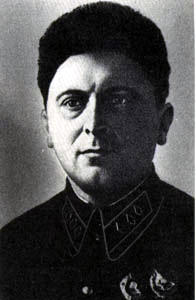Aleksandr Ivanovich Uspensky (Russian: Александр Иванович Успенский; 27 February 1902 – January 28, 1940) was a senior officer of the Cheka, the GPU and the NKVD. Uspensky was both a perpetrator and a victim of the Great Purge.
Aleksandr Uspensky | |
|---|---|
| Александр Успенский | |
 | |
| People's Commissar for Internal Affairs of the Ukrainian SSR | |
| In office 25 January 1938 – 14 November 1938 | |
| Preceded by | Israel Leplevsky |
| Succeeded by | Amayak Kobulov (acting) |
| Personal details | |
| Born | 27 February 1902 Aleksinsky Uyezd, Tula Governorate, Russian Empire |
| Died | January 28, 1940 (aged 37) Moscow, Soviet Union |
| Nationality | Soviet |
| Political party | CPSU (1920–1938) |
| Military service | |
| Allegiance | Soviet Union |
| Branch/service | NKVD |
| Years of service | 1920–1938 |
Biography
editUspensky was born on February 14 or February 28, 1902, in to the family of a Russian forestry official.[1] He studied at the local theological school in Tula. Uspensky made his career during the Russian Civil War. In August 1920, he joined the Cheka and in September the same year, he also became a member of the Russian Communist Party (b). Later he rose to be deputy head of security in the Kremlin. In February 1936, he was appointed deputy head of the West Siberian NKVD. In February 1937, he was appointed head of the NKVD in Orenburg.[2] In this role, he impressed the head of the NKVD, Nikolay Yezhov with his zeal, by having 40,000 supposed 'enemies of the people' arrested. On Yezhov's instructions, all the prisoners over 70 were shot.[3]
Summoned to Moscow for a conference of regional NKVD heads, Uspensky was told by Yezhov on January 25, 1938, that he was being posted to Kyiv (Kiev) as head of the Ukraine NKVD.[4] In February 1938, Yezhov visited Kyiv to give Uspensky a new target to arrest 30,000 people, in addition of the thousands who had already been arrested in Ukraine. During the visit, Yezhov and Uspensky got roaring drunk together.[5] During this time, Uspensky actually led the arrests of about 36,000 people.[1] In June 1938, he declared that "I consider myself a pupil of Nikolai Ivanovich Yezhov", and paid tribute to Nikita Khrushchev, then First Secretary of the Ukraine communist party, saying that "only after the faithful Stalinist Nikita Sergeyevich Khrushchev arrived in Ukraine did the smashing of the enemies of the people begin in earnest."[6]
Flight and arrest
editIn November 1938, Khrushchev received a call from Stalin telling him that Uspensky was being recalled to Moscow, where he would be arrested. Soon afterwards, there came another phone call, from Yezhov's newly appointed deputy, Lavrentiy Beria, to say that Uspensky had disappeared.[7] After faking his suicide, Uspensky went into hiding on 14 November – possibly having been warned by Yezhov of his impending arrest – and took refuge in the Ural Mountains. He was tracked down and arrested on April 15, 1939 in Miass, Chelyabinsk Oblast. On April 29, ten NKVD officers received awards for their part in capturing Uspensky.[8] On January 27, 1940, he was sentenced to death and executed the next day.
Unlike many other senior officials and officers, Uspensky was not subsequently rehabilitated.[9]
References
edit- ^ a b Uspensky A. I. // Petrov N. V., Skorkin K. V. Who led the NKVD, 1934-1941: reference book / Ed. N.G. Okhotin and A. B. Roginsky. - M .: Zvenya. 1999.
- ^ "Успенский, Александр Иванович". Мемориальный Музей "Следственная Тюрьма НКВД". Томский областой краеведческий музей им. М.Б.Шатипова. Retrieved 13 June 2021.
- ^ Marc Jansen, and Nikita Petrov (2002). Stalin's Loyal Executioner: People's Commissar Nikolai Ezhov, 1895-1940. Stanford, CA: Hoover Institution Press. pp. 131, 85. ISBN 978-0-8179-2902-2.
- ^ Chisnikov Vladimir. Heads of the State Security Bodies of Soviet Ukraine (1918-1953). Kiev.
- ^ Jansen, and Petrov. Ezhov. pp. 133–34.
- ^ Taubman, William (2005). Khrushchev, The Man, His Era. London: Simon & Schuster. p. 119. ISBN 0-7432-7564-0.
- ^ Khrushchev, Nikita (1971). Khrushchev Remembers. Sphere. pp. 79–80.
- ^ "Документ:Указ Президиума ВС СССР от 29.04.1939". Retrieved 13 June 2021.
- ^ "Uspensky, Alexander Ivanovich. On the site Chronos". Archived from the original on 2003-05-19.